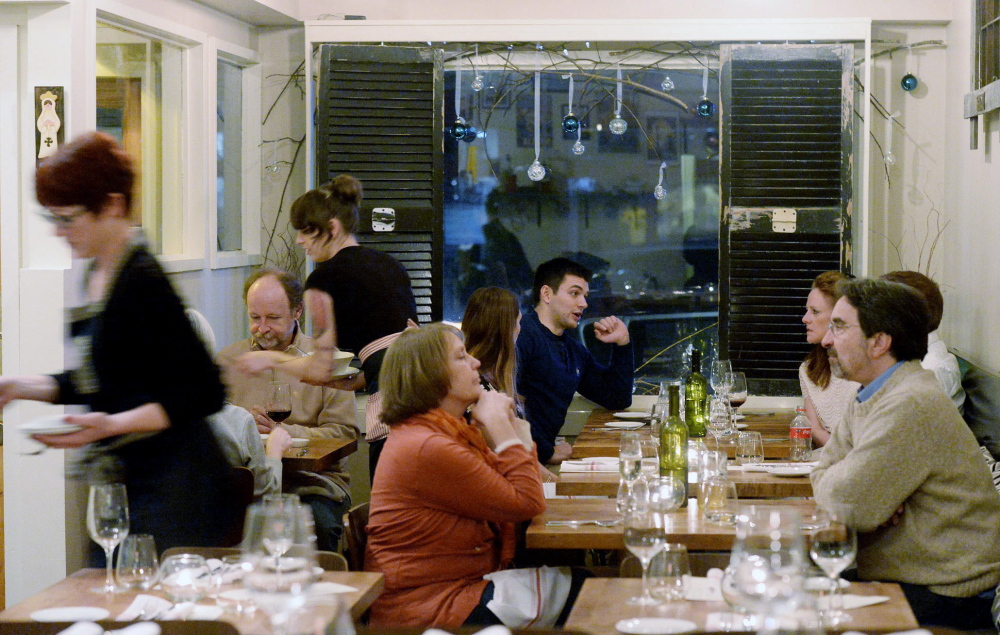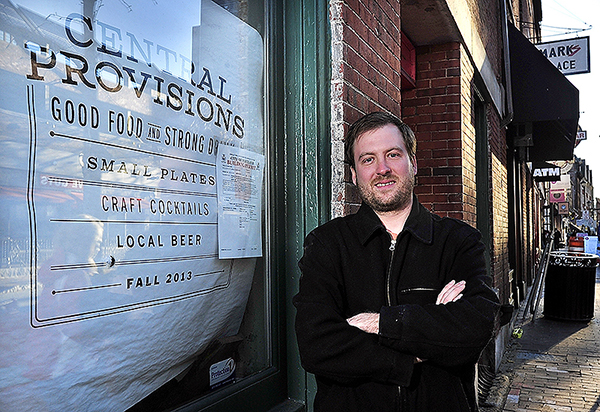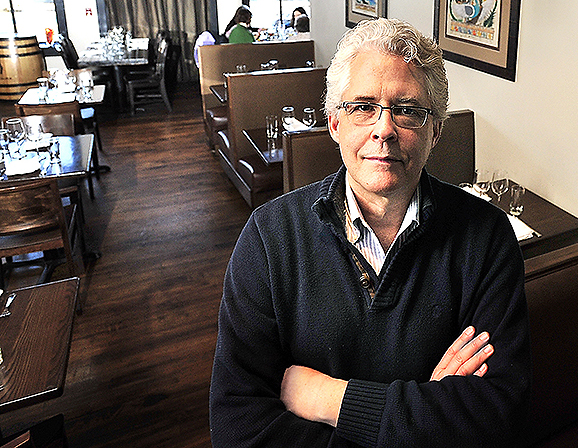Tom Bard, the proprietor of the Portland restaurant Zapoteca, has been searching for a year and a half for a place to open a new Spanish restaurant in the city.
Chef Chris Gould, a native Mainer who recently moved back here from Boston, spent months searching Maine’s largest city for a place to open his dream restaurant. He and his wife walked around the entire Portland peninsula on their days off – the Old Port, the West End, the East End, East Bayside – and even looked into places that were not listed as being for lease.
“We’d try to talk to owners and see if they’d be willing to sell their business – anything,” Gould recalled.
As Portland’s reputation as a great restaurant town has grown, so has demand for restaurant real estate. In kitchens all over the city, along with the clanking of pans you’ll hear complaints from chefs and restaurateurs about the lack of available – and affordable – restaurant space.
The city’s food reputation was built on the backs of young, independent chefs opening their own places where they could serve local, seasonal foods and let creativity and originality reign. But as space shrinks and rents rise, some chefs are worried that soon the only people able to open a restaurant in the Old Port and its outskirts will be big names with much deeper pockets than a 28-year-old just out of culinary school.
No one keeps statistics on annual vacancy rates in the Old Port, or hard stats on how much rents have changed from year to year. Some brokers do try to keep their own data, but those numbers provide only a small snapshot in time, and may cover retail spaces much too large for a restaurant.
Peter Harrington of Malone Commercial Brokers, known for brokering a lot of Old Port restaurant deals, searched his records back to 2007 and said what stands out to him most is the fact that out of the 14 restaurant rentals he’s handled in the past six years, eight of them went into spaces that were not previously restaurants.
“Portland has become a foodie town,” he said. “The Old Port has been taken over, and a large part of the retail space has gone to food.”
He said that rents on restaurant-worthy spaces in the Old Port are indeed going up. “I would probably peg it, over 10 years, probably in the 40 to 50 percent range,” he said.
If a space is already outfitted for use as a restaurant, he said, “you can get a premium for it.”
Other brokers agree that restaurant space is getting harder to find in Portland, especially with more chefs and chain restaurants from away sniffing around the city, hoping to grab a piece of the pie.
“We’re finding a lot of demand from new restaurants, and from even existing restaurants looking to open second locations,” said Drew Sigfridson, a broker with the Boulos Co. and president of the Maine Real Estate and Development Association. “A lot of them want to be on the Portland peninsula, ideally in the Old Port area, and it’s increasingly difficult to find good restaurant spaces.”
EXISTING KITCHENS RENT QUICKLY
Tom Bard prefers, like most restaurateurs, to find a place with an existing kitchen. When those pop up, he said, they are either snapped up quickly or the rent rises to the point that it’s out of reach. “The low-hanging fruit, if you will, of those have been picked,” he said.
With little or no spaces to choose from, restaurateurs are left with the less desirable option: taking retail space that’s often in an old, multistory building and adding a kitchen, bathrooms, venting and the other necessary improvements to transform it into a restaurant. Not only is this expensive – Bard estimates it can cost from $250,000 up to $500,000 – it’s a tough pill to swallow spending that much money on a building you don’t even own.
“The number one issue is venting,” said Joseph Malone of Malone Commercial Brokers. “Typically the fire department wants you to vent through the roof for your hoods.”
Once a space becomes a restaurant, it’s likely to stay one, Malone said.
Restaurateurs who want a space in the heart of the Old Port generally pay double what they would for a space just a couple of blocks over. But rents also vary dramatically even within the Old Port district, said Justin Lamontagne, a broker with The Dunham Group.
“For example, on areas of Commercial Street you can do deals in the $20-a-foot range,” he said. “On the heart of Exchange Street, which is only 100 or 200 yards away, it’s double or triple that, depending on the space. There are spaces out there where the asking rates are $40 a foot plus. It’s hard to characterize the Old Port as a single area. It really varies drastically street to street, block to block.”
Most restaurateurs are looking for spaces in the 1,500- to 2,000-square-foot range.
“That’s the real sweet spot,” Malone said. “That’s really where they can do enough volume and still feel intimate and still have really good quality control.”
The Goulds ended up buying one of the oldest buildings in the Old Port, on the corner of Fore and Dana streets, and are spending lots of money (they won’t say how much) on extensive renovations to turn it into a restaurant called Central Provisions, expected to open in January.
“It’s not easy to find a space at all,” Gould said. “We looked for almost a year, probably. If you’re looking for a space that’s currently a restaurant – that’s ideal – that’s hard to find. And then if you do find a space that’s not a restaurant, you’ve got to find (a landlord) who wants to let you build a restaurant in their space.”
CHEFS COMING FROM AWAY
A lot of the chefs looking for restaurant space in downtown Portland these days are like Gould – they’re coming from places like New York and Boston where they either had their own restaurants or were head chefs, and want to strike out on their own. They choose Portland because of its quality of life and vibrant food scene, Malone said.
“That is definitely a trend we’ve seen, is more people coming in from out of town saying we want to start a place, rather in the past it was homegrown guys,” Malone said.
Given the limited options, some chefs have started searching in other parts of the city, where restaurants have already “seeded” small neighborhoods. (Think the fringes of the Old Port, or Longfellow Square.) “I think that some chefs and restaurateurs are seeing that you don’t necessarily have to be in the Old Port,” Sigfridson said, “and if you have a good concept you can still do well and draw people to you.”
Malone said that a few years ago it was hard to get a restaurateur to even look at Commercial Street because “it was just a little edgy.” Now that it has more foot traffic, he said, Commercial Street is “on fire.”
“That’s been a change over the course of the last 10 years,” said Karen Rich of Cardente Real Estate, who is preparing the retail forecast for MEREDA’s annual conference in January. “(Commercial Street) has become as desirable if not more desirable an address as Exchange Street.”
With all the hurdles to jump, some chefs give up on Portland.
SETTLING ON BIDDEFORD
Chad Conley, chef at Gather in Yarmouth, looked around Portland for a couple of months with his business partner, Greg Mitchell. They never even considered the Old Port. “I just wrote it off immediately,” Conley said. “Rents were going to be too high, and I wasn’t looking to have that level of competition.”
Instead, they focused on nearby areas – the West End, the East End and East Bayside. They still couldn’t come up with a situation that fit their budget, Conley said, “or a landlord that wanted to do anything other than make lots of money by selling condos, which was a situation we came across quite a few times.”
They eventually settled on Biddeford and became proprietors of the Palace Diner.
“We see a lot of potential there,” Conley said. “There’s already some really interesting things going on. And as soon as we started poking around, we realized that a lot of landlords and a lot of people in town were looking for people like us – young, energetic chefs with good ideas – and our budget fit the town a lot better.”
Conley said they are realistic, knowing they probably won’t make as much money as they would in Portland. But that’s OK. They get to keep their creative freedom, be themselves and have fun.
Conley is still a bit sad, though, about the way things have turned out. He worries that Portland’s restaurant scene is starting to shift toward more corporate-owned chains and big names, rather than a place where young, local chefs can show what they’re made of and build a career.
“To me it feels like, especially with the hotel expansion that’s happening in Portland, we’re going to start to see bigger-name or corporate-name chefs coming in – not just smaller chain restaurants, but people from away with name recognition and more money,” Conley said. “It’s unfortunate because as a resident of Portland, and as somebody who grew up in Portland, the Old Port means something to me other than chain stores, so it’s kind of sad to watch that transition happen.”
Brokers say that while larger chains still prefer South Portland, there’s already a lot of interest from regional chains in the Old Port.
Jeff Landry, chef/owner of The Farmer’s Table on Commercial Street, recently sold his business to Elevation Burger, a small chain that has restaurants in a dozen states. Once it goes in, the Old Port will have three hamburger chains.
Bard said it’s likely celebrity chefs will start poking around Portland soon, looking for a spot to open another restaurant.
“They’re not considered a chain, but they’ve got five or six or 10 high-end, expensive restaurants in cities all over the country,” he said. “That’s what this town will end up having. The larger, wealthier, branded chefs are going to be able to afford to come into this town, but the locals are going to have a much tougher time.”
Meredith Goad can be contacted at 791-6332 or at:
mgoad@pressherald.com
Send questions/comments to the editors.






Comments are no longer available on this story